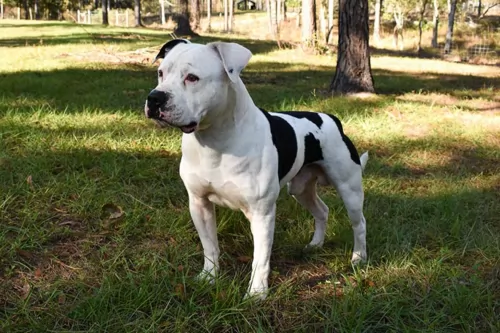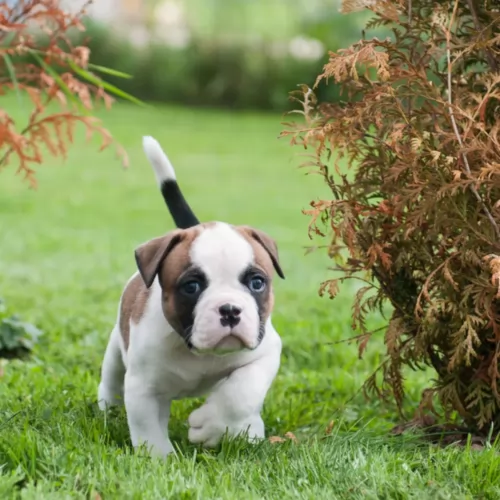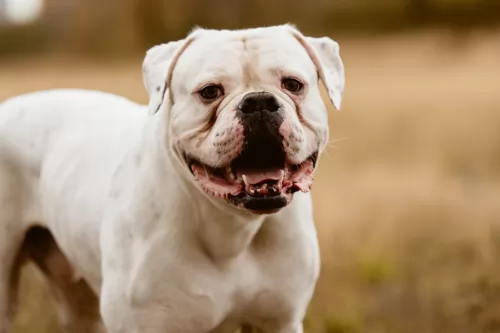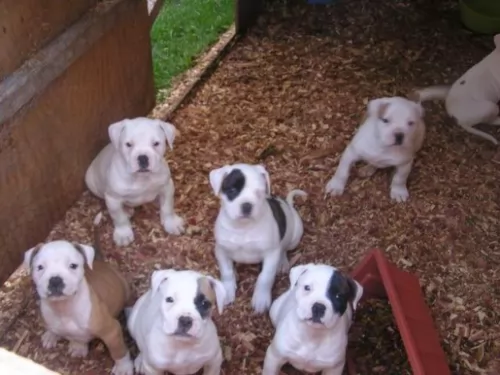 Petzlover
Petzlover American Bulldog is originated from United States but Peruvian Hairless is originated from Peru. American Bulldog may grow 20 cm / 8 inches higher than Peruvian Hairless. American Bulldog may weigh 29 kg / 64 pounds more than Peruvian Hairless. American Bulldog may live 4 years more than Peruvian Hairless. American Bulldog may have more litter size than Peruvian Hairless. American Bulldog requires Low Maintenance. But Peruvian Hairless requires Moderate Maintenance
American Bulldog is originated from United States but Peruvian Hairless is originated from Peru. American Bulldog may grow 20 cm / 8 inches higher than Peruvian Hairless. American Bulldog may weigh 29 kg / 64 pounds more than Peruvian Hairless. American Bulldog may live 4 years more than Peruvian Hairless. American Bulldog may have more litter size than Peruvian Hairless. American Bulldog requires Low Maintenance. But Peruvian Hairless requires Moderate Maintenance
 Following World War II, the American Bulldog was almost extinct.
Following World War II, the American Bulldog was almost extinct.
Thanks to John D. Johnson from Summerville, Georgia the breed is still with us today. He gathered the best dogs he could find throughout the rural South and bred them back into popularity among his family and other rural families. His father bred the American Bulldog before John did and they have bred them longer than any other in any part of the world. His dogs were regularly used for tracking, hunting, guarding, watchdog and weight pulling. At some point Alan Scott joined Johnson breeding other bulldogs to Johnson's and forming the Standard American Bulldog.
The American Bulldog/ is popular today as a family pet and companion as well as a working dog.
 This is an ancient breed, and he even looks like he comes from ancient times. This particular dog, the Peruvian Hairless, was part of the Inca Empire and it is amazing that depictions of Peruvian hairless dogs have been seen around around 750 A.D.
This is an ancient breed, and he even looks like he comes from ancient times. This particular dog, the Peruvian Hairless, was part of the Inca Empire and it is amazing that depictions of Peruvian hairless dogs have been seen around around 750 A.D.
It is believed the dogs were a meal for many in those ancient times, and that together with the Spanish conquest of Peru resulted in the dog almost being wiped out.
Today the dog is held in esteem in Peru and it is looked upon as the national dog of Peru – an accolade this dog received in 2001. The Federation Cynologique Internationale has accepted this breed and also adopted an official breed standard.
 The American Bulldog is a powerful and muscular dog in a sturdy and compact frame. The female is more refined than the heavy boned and stocky male, but both genders are athletic, agile and quick. The have large heads, strong jaws, a muscular neck and with a moderately deep and wide chest.
The American Bulldog is a powerful and muscular dog in a sturdy and compact frame. The female is more refined than the heavy boned and stocky male, but both genders are athletic, agile and quick. The have large heads, strong jaws, a muscular neck and with a moderately deep and wide chest.
They have a square head, with muscular cheeks and a clearly defined furrow between his eyes. With broad, square and strong muzzles, they have a reverse scissors, scissors, moderate underbite and an even bite. Ears come in a variety of shapes and sizes and eyes can be any color as well. The nose however should be black and lips black as well. Their legs are strong, heavy boned and straight with well-defined muscles in the hindquarters. Finally ,they have a thick, low set tail that comes to a point at the end.
 There is no doubt that the most important feature of this dog is its hairlessness, but there is nearly always a little bit of hair on top of its head and on the tip of the tail.
There is no doubt that the most important feature of this dog is its hairlessness, but there is nearly always a little bit of hair on top of its head and on the tip of the tail.
The color of the dog’s skin can be dark brown, mottled or a grey shade. They can be a solid color or grey or brown but with pink spots. The eyes of the dog are brown and the ears can be floppy or erect and the tail is long.
He stands at anything between 25 to 50cm, depending on whether he is a small or medium sized Peruvian. Weights can vary too but can be 4kg for the smaller type, going up to 25 kg for the larger dogs. The dogs are always slim.
Peruvian Hairless dogs love their human families, being somewhat wary around strangers. They are lively, intelligent, alert and protective.
Lean and agile, they can be quick too. Just like with any other dogs, he will require training and socialization if you want him to be obedient and well behaved. He gets on well with other pets in the house and will get on well with disciplined children. This is a quiet dog but even so, he makes a good guard dog.
 The American Bulldog is characteristically loyal, brave and reliable. It is a friendly, gentle dog that truly loves children. There is not a hostile bone in his body despite his history and reputation for bull baiting. Though he is protective of its family and affectionate with most, he still needs a human companion who is strong willed and a genuine pack leader. Without this he might become aggressive around other dogs and pets. They are immensely self-confident and they do slobber and drool and will become excited and hard to handle without daily exercise of both their body and their minds.
The American Bulldog is characteristically loyal, brave and reliable. It is a friendly, gentle dog that truly loves children. There is not a hostile bone in his body despite his history and reputation for bull baiting. Though he is protective of its family and affectionate with most, he still needs a human companion who is strong willed and a genuine pack leader. Without this he might become aggressive around other dogs and pets. They are immensely self-confident and they do slobber and drool and will become excited and hard to handle without daily exercise of both their body and their minds.
 From ancient times, the Peruvian Hairless has been man’s best friend, and June 12th is the official day of the Peruvian Hairless Dog. These dogs love being surrounded by their human family. They are cheerful, playful, social dogs and they make great playmates for children when the children don’t rough play too much so as to injure him.
From ancient times, the Peruvian Hairless has been man’s best friend, and June 12th is the official day of the Peruvian Hairless Dog. These dogs love being surrounded by their human family. They are cheerful, playful, social dogs and they make great playmates for children when the children don’t rough play too much so as to injure him.
He is also a good watchdog and when he isn’t protecting you or playing he can be calm and quiet, and slot easily into life in the countryside or the city. Treat him well and you'll enjoy excellent friendship from this hairless canine friend.
 Though generally healthy, the American Bulldog is prone to a few problems.
Though generally healthy, the American Bulldog is prone to a few problems.
This is a serious issue in many breeds of dogs and is especially prevalent with the American Bull Dog. This may seem ironic in such a short legged dog but it is unfortunately very common. It is a genetic disorder that causes the bones in the joint to separate and causes the dog much pain and lameness.
Due to skin folds you need to be care and watch for irritation and infection in the folds. They are also prone to ear infections.
The American Bulldog is prone to overeating and all the health issues that presents. With short legs and a genetic predisposition to arthritis and hip dysplasia, obesity is a real health risk for your bulldog.
 Like all breeds there will be some health problems with your Peruvian Hairless, although with good care care this dog can live to be 12 years of age or maybe even a little older. Some things to look out for include -
Like all breeds there will be some health problems with your Peruvian Hairless, although with good care care this dog can live to be 12 years of age or maybe even a little older. Some things to look out for include -
You may notice your dog not eating his food, having an upset stomach and vomiting. Irritable bowel syndrome in a dog is a persistent upset stomach, resulting in diarrhea and bloating. IBS isn’t reserved for older dogs, and it can affect any breed or sex. You’ll notice your pet being listless and without energy. In severe cases of IBS, you may notice blood in your pet’s feces. Don’t allow your canine friend to suffer – get him to the vet.
Also known as epilepsy, it can be disturbing for you to see your canine friend having a seizure. Uncontrolled bursts of electrical activity in your dog’s brain cause these seizures which are a mix of twitching and shaking. The seizure can last for less than a minute or for several minutes. A number of things can cause these seizures in dogs – head injuries, anemia, kidney disease, liver disease, electrolyte problems, brain cancer among others.
Many dogs suffer with one or other skin problems and these can be painful and frustrating. Hairless breeds are more likely to suffer with skin issues and they require special grooming and skin care to prevent dryness, insect bites, sunburn etc.
 For some, the lack of hair is appealing to some people who battle with allergies. The skin of the dog will need to be washed to remove dirt. You’ve got to be careful however, what you wash your dog with because these dogs are known to get blackheads and acne because of blocked pores.
For some, the lack of hair is appealing to some people who battle with allergies. The skin of the dog will need to be washed to remove dirt. You’ve got to be careful however, what you wash your dog with because these dogs are known to get blackheads and acne because of blocked pores.
Then again, the skin can become quite dry, so you need to strike a balance. Talk to a dog expert or your vet on how to care for such a dog’s skin.
You’ll also need to consider your dog when he goes outside into the sun. Protection against sunlight is recommended and once again you might want to find out about sun blocks. Because of the lack of hair, he may also be sensitive to the cold.
Make sure this unusual pet gets the right diet. You want to be sure that whether you feed him commercially manufactured foods or he gets some home-made food it is full of vitamins and minerals. Steer away from spicy, unusual foods as dogs love simplicity and consistency.